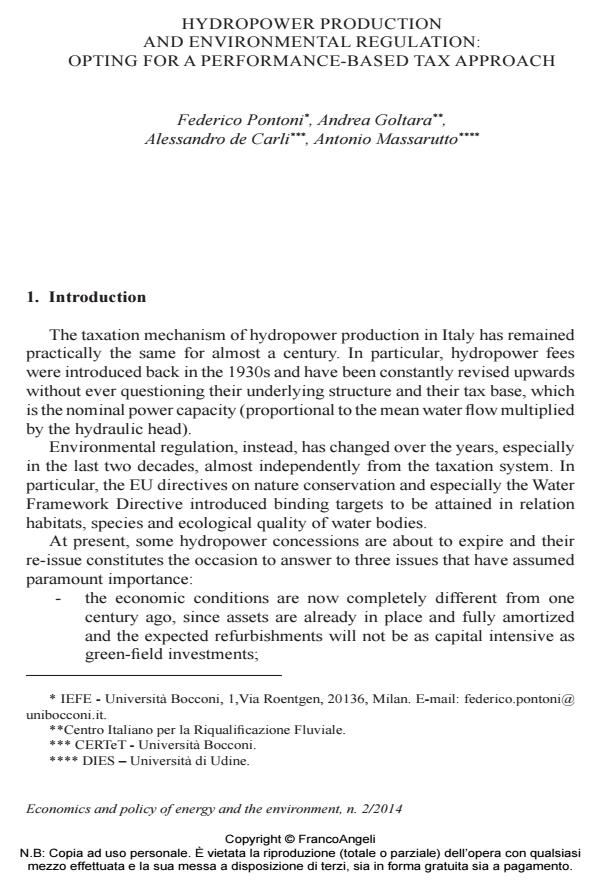Hydropower production and environmental regulation: opting for a performance-based tax approach
Journal title ECONOMICS AND POLICY OF ENERGY AND THE ENVIRONMENT
Author/s Federico Pontoni, Andrea Goltara, Alessandro De Carli, Antonio Massarutto
Publishing Year 2015 Issue 2014/2
Language English Pages 16 P. 137-152 File size 197 KB
DOI 10.3280/EFE2014-002007
DOI is like a bar code for intellectual property: to have more infomation
click here
Below, you can see the article first page
If you want to buy this article in PDF format, you can do it, following the instructions to buy download credits

FrancoAngeli is member of Publishers International Linking Association, Inc (PILA), a not-for-profit association which run the CrossRef service enabling links to and from online scholarly content.
This paper discusses the case for reforming the actual mechanism for charging water abstractions for hydropower production in Italy and proposes to introduce a performance-based environmental fee. This should be able, on the one hand, to internalize the environmental costs that hydropower production causes and, on the other, to stimulate producers to opt for more environment-friendly management of hydropower plants. We think, in fact, that the re-issue of several expired hydropower concessions represents an opportunity to redefine the taxation system to which hydropower is currently subject to, in order to introduce finally a form of environmental taxation coherent with the Water Framework Directive. In particular, the proposed fee is a real environmental tax, as it aims at changing the environmentally impacting behavior by increasing the marginal cost of damaging river ecosystems. Therefore, it is equitable, as it does not tax all producers the same way, but according to the impacts that their production generates. Finally, it is immediately applicable, as it is based on the successful experience of performance-based regulation in several other sectors.
Keywords: Environmental Fee, Water Framework Directive, Hydropower
Jel codes: H21, H23, L51, Q25, Q28, Q5
- Barde J.-P. (1997). Environmental taxation: experience in OECD countries. In T. O’Riordan (Ed.). Ecotaxation. London, Earthscan, 223–245.
- Bateman I.J., Carson R., Day B., Hanemann M., Hanley N., Hett T., Jone-Lee M., Loomes G., Mourato S., Ozdemiroglu E., Pearce D., Sugden R., Swanson J.(2002). Economic Valuation with Stated Preference Techniques: A Manual. Edward Elgar Publishing Limited, Cheltenham.
- Bateman I.J., Mace G.M., Fezzi C., Atkinson G., Turner R.K. (2011). Economic analysis for ecosystem service assessments. Environ Resour Econ, 48(2), 177-218.
- Baumol W. J., Oates W. E. (1998). The theory of environmental policy. Cambridge, Cambridge University Press.
- Bratrich C., Truffer B., (2001). Green Electricity Certification for Hydropower Plants-Concepts, Procedure, Criteria. EAWAG Ökostrom Publikationen 7, Kastanienbaum.
- de Carli A. (a cura di), (2014). IDEA – Idroelettrico: Economia e Ambiente. Rapporto per la Provincia di Sondrio.
- Ekins P. (1999). European environmental taxes and charges: recent experience, issues and trends. Ecological Economics, 31, 39-62.
- EU Commission (2000). “Pricing and sustainable management of water resources”. Communication from the Commission to the Council, European Parliament and Economic and Social Committee, COM (2000) 477.
- Goltara A. (coordinatore), Bizzi S., Boz B., Polazzo A. e Schipani I. (2011).
- CH2OICE - Metodologia operativa italiana. Task 4.3 - Deliverable 4.1. www.ch2oice.eu.
- HRC (2006). Scientific approaches for evaluating hydroelectric project effects (updated in 2008). Washington, D.C., U.S.A. www.hydroreform.org.
- Joskow P. (2008). Incentive regulation and its application to electricity networks. Review of Network Economics, 7(4), 547-560.
- Oates W. E. (1991). Pollution Charges as a Source of Public Revenues. Discussion Paper No. QE92-05, Resources for the Future, Washington, DC. Terna (2013). Dati Storici.
- TEEB (2010). The Economics of Ecosystems and Biodiversity: Mainstreaming the Economics of Nature: A Synthesis of the Approach, Conclusions and Recommendations of TEEB.
- Water Law, Policy and Economics in Italy Giulia Vaglietti, Federico Pontoni, Alessandro de Carli, Antonio Massarutto, pp.57 (ISBN:978-3-030-69074-8)
- Households' preferences for wood in home heating systems: Does sustainability matter? Stefania Troiano, Veronica Novelli, Paola Geatti, Matteo Carzedda, Francesco Marangon, Luciano Ceccon, in ECONOMICS AND POLICY OF ENERGY AND THE ENVIRONMENT 2/2022 pp.101
DOI: 10.3280/EFE2021-002005 - Choice experiments and environmental taxation: An application to the Italian hydropower sector Federico Pontoni, Daniel Vecchiato, Francesco Marangon, Tiziano Tempesta, Stefania Troiano, in ECONOMICS AND POLICY OF ENERGY AND THE ENVIRONMENT 3/2017 pp.99
DOI: 10.3280/EFE2016-003009
Federico Pontoni, Andrea Goltara, Alessandro De Carli, Antonio Massarutto, Hydropower production and environmental regulation: opting for a performance-based tax approach in "ECONOMICS AND POLICY OF ENERGY AND THE ENVIRONMENT" 2/2014, pp 137-152, DOI: 10.3280/EFE2014-002007